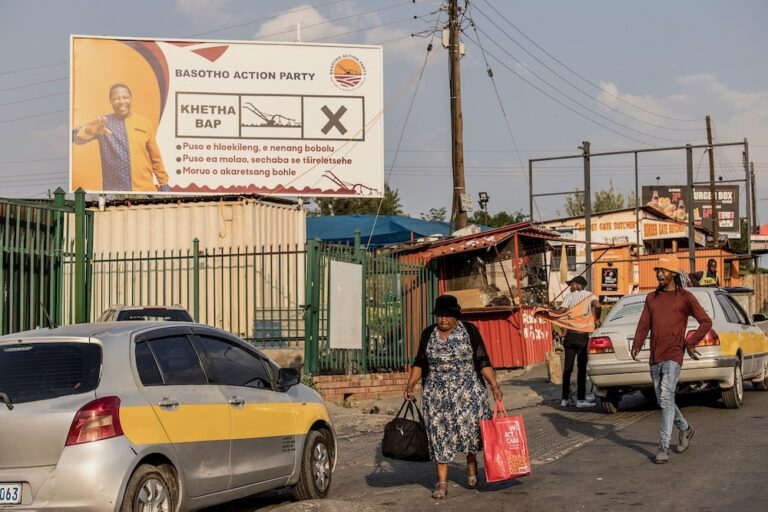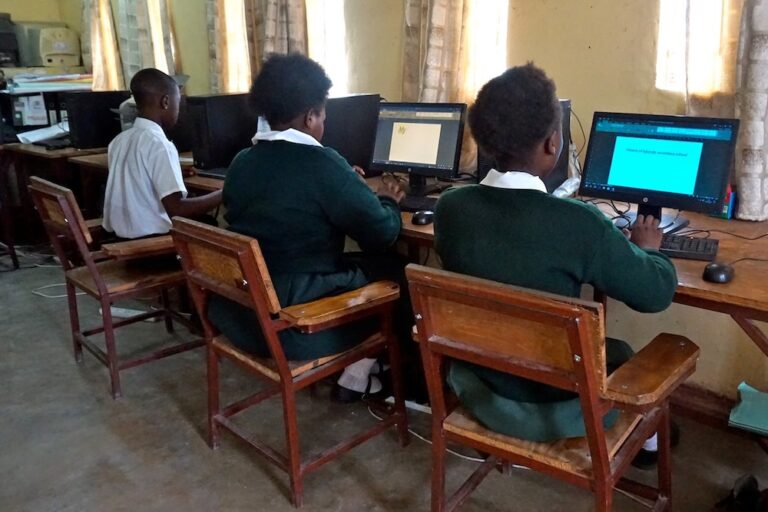(MISA/IFEX) – On 16 April 1999, journalists from the “Post” newspaper facing charges of espionage were committed to the High Court for trial. A thirteenth journalist was discharged on a nolle prosequi. **Updates IFEX alerts of 1 April, 26 March, 25 March, 22 March, 19 March, 18 March, 17 March, 15 March, 12 March, 11 […]
(MISA/IFEX) – On 16 April 1999, journalists from the “Post” newspaper facing
charges of espionage were committed to the High Court for trial. A
thirteenth journalist was discharged on a nolle prosequi.
**Updates IFEX alerts of 1 April, 26 March, 25 March, 22 March, 19 March, 18
March, 17 March, 15 March, 12 March, 11 March and 10 March 1999**
The twelve are: managing director and editor Fred M’ membe, Dickson Jere,
Reuben Phiri, Brighton Phiri, Mukalya Nampito, Joe Kaunda, Macpherson
Muyumba, Liseli Kayumba, Lubasi Katundu, Goodson Machona, Douglas Hapande
and Kelvin Shimo.
The journalists appeared before principle magistrate Edward Zulu for mention
when prosecutor John Katongo said the state was ready to proceed with the
case in the High Court.
Amos Malupenga, who also appeared with the rest, was released and no
explanation was given for his “freedom.” Malupenga told the Zambia
Independent Media Association (ZIMA) that he was not impressed with the
state because, right from the start, the state knew that he and his
colleagues had no case to answer. He added that granting him a nolle
prosequi was an abuse of judicial process.
“I would have loved to be acquitted by the High Court rather than the state
entering a nolle. This is the beginning of many nolles to come,” Malupenga
told ZIMA.
Asked by ZIMA shortly after the court session why Malupenga had been
released, “Post” lawyer Sakwiba Sikota said the courts were not obliged to
give any reasons but that he suspected that it could be that Malupenga was
on leave at the time the contentious article was written. “But some of the
people charged with the offence were also out of the country when the story
was published,” he observed.
The paper’s news editor, Mukalya Nampito, expressed optimism that the case
would not proceed because a case would not be found against all the accused.
“The state is beginning to realise that the case is going nowhere because we
are not guilty,” she stated.
Commenting further on the case, one of the lawyers representing the “Post”,
Nelly Mutti, said that it was very strange that the state could arrest and
charge almost all the newspaper’s reporters with espionage. “This is the
very first time that we have a case of this kind in Zambia,” she said.
Outside the court there was a hive of activity as hundreds of
placard-carrying supporters and sympathisers of the “Post” chanted and
displayed their banners before an equally enthusiastic crowd. In addition to
journalist organisations led by ZIMA, human rights groups, NGOs, University
of Zambia students and political parties joined in the show of solidarity
with the “Post”. One of the University of Zambia student’s placard read:
“Arrest the real gun runners and leave scribes alone.”
The newly formed “Village News”, belonging to the Zambia Independent
Monitoring Team, had a banner which read: “We oppose harassment and
molestation of journalists.”
The Forum for Democratic Process’ banner read: “A vibrant and independent
media is an indispensable pillar of democracy.”
The placard by students from the Evelyn Hone College of journalism read: “We
are the future. Stop harassing the Post.”
The University of Zambia campus “Herald” newspaper’s banner said: “No more
to mass arrests of Zambia’s only watchdog.”
Among those present were leaders of five political parties, scores of
lawyers and academics. The National Pressure Group, a newly formed political
organisation, turned the occasion into a mini political rally with songs
denouncing the Movement for Multi-party Democracy (MMD) government of
president Frederick Chiluba.
One of their placards read: “We are behind the Post. What they reported is
public information on the Internet.”
Another read: “We want Press Freedom…stop the rot.”
The trial of the journalists will commence in May. If found guilty, they
face a prison term of no less than twenty years.
Background Information
The charge of espionage against the journalists followed a lead article in
the 9 March edition of the paper which questioned the military capacity of
Zambia to withstand an incursion from Angola.
On the night of 9 March and the morning of 10 March, police in Lusaka
rounded up six reporters of the “Post”, apparently after an order for the
police to arrest all “Post” journalists before dawn on 10 March. Police
tried to arrest more journalists, but they managed to give them the slip.
The six were released on 12 March following a harbeas corpus application by
the newspaper. Between 17 and 31 March, police systematically called in the
entire editorial staff of the newspaper and charged them with espionage, the
result of which is the twelve journalists who are now standing trial.
The 9 March arrest of the reporters was coupled with a siege of the “Post”
editorial offices and its separately located printing press, resulting in a
delay of several hours in the printing of the paper. On 10 March, police
surrounded the two buildings, prevented anyone from entering or leaving, and
cut the power and water supply. On 11 March,
the “Post” failed to appear on the streets of Lusaka as scheduled, the first
time this had happened in its seven-year history. Those trapped in the
building housing the printing press managed to print the paper, but the
police prevented it from being distributed. The 11 March edition of the
paper was eventually sold openly on the streets of Lusaka on the following
day.
Recommended Action
Send appeals to the President:
Zambian authorities to silence the “Post”
over which the journalists are now being charged with espionage, was neither
classified nor secret, and was easily available through publicly accessible
sources worldwide
heavily on the “Post” since it was in the interests of the Zambian people to
be fully aware of the military capacity of their country particularly in
view of the tension which existed between Zambia and Angola at the time
expression
and its obligation to properly inform the Zambian people, both of which
constitute inalienable rights of the Zambian people as recognised by the
Zambian Constitution and numerous other international treaties to which
Zambia is a signatory
as
they are a violation of their human rights, and indeed, the human rights of
all the people of Zambia
Appeals To
Frederick Chiluba
President of the Republic of Zambia
State House
Lusaka, Zambia
Fax: +260 1 221 939
E-mail: state@zamnet.zm / mfalus@zamnet.zm
Please copy appeals to the source if possible.


